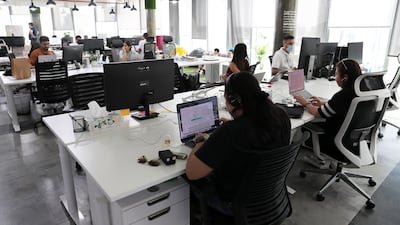The majority of the world’s employees “continue to struggle at work and in life”, a major survey has revealed.
Gallup’s State of the Global Workplace 2024 report released on Wednesday noted that global employee engagement stagnated and employee well-being declined in 2023, after years of steady gains.
Employee well-being fell from 35 per cent to 34 per cent with the decline felt most by workers under 35.
The poll found 41 per cent of the world's employees experienced “a lot of stress” and 20 per cent endured daily loneliness, with this highest for fully remote workers.
And actively disengaged employees – workers who actively oppose their employer’s goals – comprise 15 per cent of the global workforce.
“What we cannot definitively answer is the why,” Pa Sinyan, Europe, Middle East and Africa managing partner at Gallup, told The National.
“Is it the fast pace of change? Is it the numerous challenges and conflicts around the world? I personally believe social media is part of our … dip in well-being.”

UAE bucks the regional and global trend
The good news is the UAE has bucked this trend as its workplaces were still the most engaged in the Middle East and North Africa region, with surging confidence in the UAE job market meaning employers will have their work cut out to retain talent.
The Mena region – Algeria, Bahrain, Egypt, Iran, Iraq, Israel, Jordan, Kuwait, Lebanon, Libya, Morocco, Saudi Arabia, State of Palestine, Tunisia, Turkey, the UAE and Yemen – had the highest regional percentage of employees experiencing daily stress; the lowest regional proportion of employees who say it is a good time to find a job where they live; and the second lowest regional ratio of engaged employees.
But the study found 29 per cent of employees were engaged at work in the UAE – an increase of 2 percentage points on last year’s report – outpacing the global average of 23 per cent and well above the average 14 per cent Mena average.
Still, the rest are disengaged or actively disengaged, meaning they are either quiet quitting, putting in no more than the bare minimum of work required, or loud quitting, where employees are vocal about their discontent.
Gallup estimated low employee engagement costs the global economy $8.9 trillion, or 9 per cent of global GDP.
“In Europe, you have the lowest engagement levels in the world but the highest well-being levels,” said Mr Sinyan.
“But when we look at the Middle East as a region, we do see those things go hand in hand. The UAE stands out for that reason.”
Mr Sinyan said the work-hard culture that often exists in the UAE can play a role in boosting engagement at work.
“I'm not trying to say that's great, but [it] can give us a sense of purpose,” he said, warning that engagement did not mean job satisfaction or feeling happy but the ability to grow, be held accountable and know what is expected at work.
“The UAE [is] just very dynamic,” he said. “You work hard, you can grow … while in many other parts of the world, there is more stagnation in the employee experience.”
Boost for the job market
The report also had good news for the UAE’s job market with more than two thirds of employees in the UAE – 69 per cent – saying it was a good time to find a job, up from 59 per cent last year.
This rise in optimism places the UAE significantly higher than the global average of 54 per cent and well ahead of the region where 33 per cent of employees, the lowest regional percentage, say it is a good time to find a job where they live.
In the UAE, 40 per cent of employees report looking out for or actively seeking a new job, lower than the regional figure – 48 per cent – compared to the even higher rate of 52 per cent of employees globally.
Gallup believe the increase in people thinking it is a good time to look for a new job will present a challenge for organisations to retain their top talent.
A note of caution
However, the study also struck a note of caution, finding Mena had the highest regional percentage of employees feeling stress – 52 per cent – with more than half of employees experiencing it daily, compared with 41 per cent globally.
Fewer workers reported experiencing daily stress in the UAE – 33 per cent – where levels stayed the same compared to last year.

And 24 per cent experience daily sadness in the UAE, below the regional rate of 26 per cent and closer to the global average of 22 per cent.
In terms of loneliness, the report found 26 per cent of employees in UAE report experiencing loneliness daily, which was similar to regional findings of 23 per cent and higher than the global rate of 20 per cent.
In general, working adults are less lonely than the global average but experts say working from home can cause more feelings of isolation.
Government well-being initiatives, such as the National Strategy for Well-being 2031, and an increasing focus placed by companies on the mental health of their employees have previously been flagged as helping in this regard.
The report said for employers, addressing mental health requires support for thriving in life and engagement at work.
"The more you come to the office, the more you have bonds, the more you have relationships and the less lonely you are," said Mr Sinyan. "So there's sort of a clash right now between what people want and what's good for them.
“Engagement is one of those mitigators of loneliness. So something that the UAE is doing well is one of the best mitigators of loneliness, which is great engaging workplaces.”
Gallup typically surveys 1,000 people in each country or area using a standard set of core questions translated into the respective country’s major languages. In some countries, Gallup collects samples in major cities or areas of special interest


